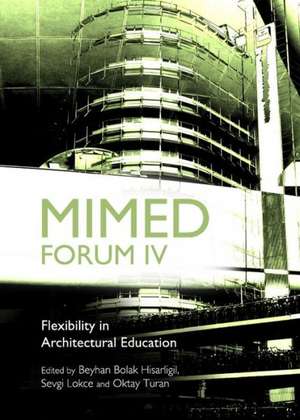Mimed Forum IV: Flexibility in Architectural Education
Editat de Beyhan Bolak Hisarligil, Sevgi Lokce, Oktay Turanen Limba Engleză Hardback – 4 sep 2013
Preț: 509.44 lei
Preț vechi: 661.62 lei
-23% Nou
Puncte Express: 764
Preț estimativ în valută:
97.49€ • 100.72$ • 81.09£
97.49€ • 100.72$ • 81.09£
Carte indisponibilă temporar
Doresc să fiu notificat când acest titlu va fi disponibil:
Se trimite...
Preluare comenzi: 021 569.72.76
Specificații
ISBN-13: 9781443842655
ISBN-10: 1443842656
Pagini: 375
Dimensiuni: 156 x 215 x 29 mm
Greutate: 0 kg
Ediția:New.
Editura: Cambridge Scholars Publishing
ISBN-10: 1443842656
Pagini: 375
Dimensiuni: 156 x 215 x 29 mm
Greutate: 0 kg
Ediția:New.
Editura: Cambridge Scholars Publishing
Notă biografică
Beyhan Bolak Hisarligil is an architect and teaches architectural theory and design at Meliksah University in Turkey. She did her undergraduate work at Erciyes University and received a Master's Degree in architectural design at Middle East Technical University. She received her Ph.D degree in architecture from Istanbul Technical University with a thesis titled 'A Poetic Thinking of Dwelling: The In-between in Vernacular Anatolian Settlements'. She designs research centres in Turkey and she is the author of "Narrative Space in 'the Black Book' by Orhan Pamuk". She is currently the head of Department of Architecture at Meliksah University. Sevgi Lokce received a bachelor of architecture degree from Ankara State Academy, and a master of architecture and a doctoral degree from the Gazi University Institute of Science . She has taught in schools of architecture in Turkey: Gazi University, Erciyes University, and Eastern Mediterranean University in Northern Cyprus. Her activities take place on architectural education, architectural design, history and criticism. She has worked as a dean at Erciyes University Faculty of Architecture from 2004 to 2010. She is currently professor and head of Department of Architecture at the Atilim University in Ankara and she is also the founder member of MIMED. Oktay Turan studied architecture at Gazi University Faculty of Architecture in 2004, and got his master degree in architecture in 2008 at METU. Recently, he is a Ph.D candidate at METU.
